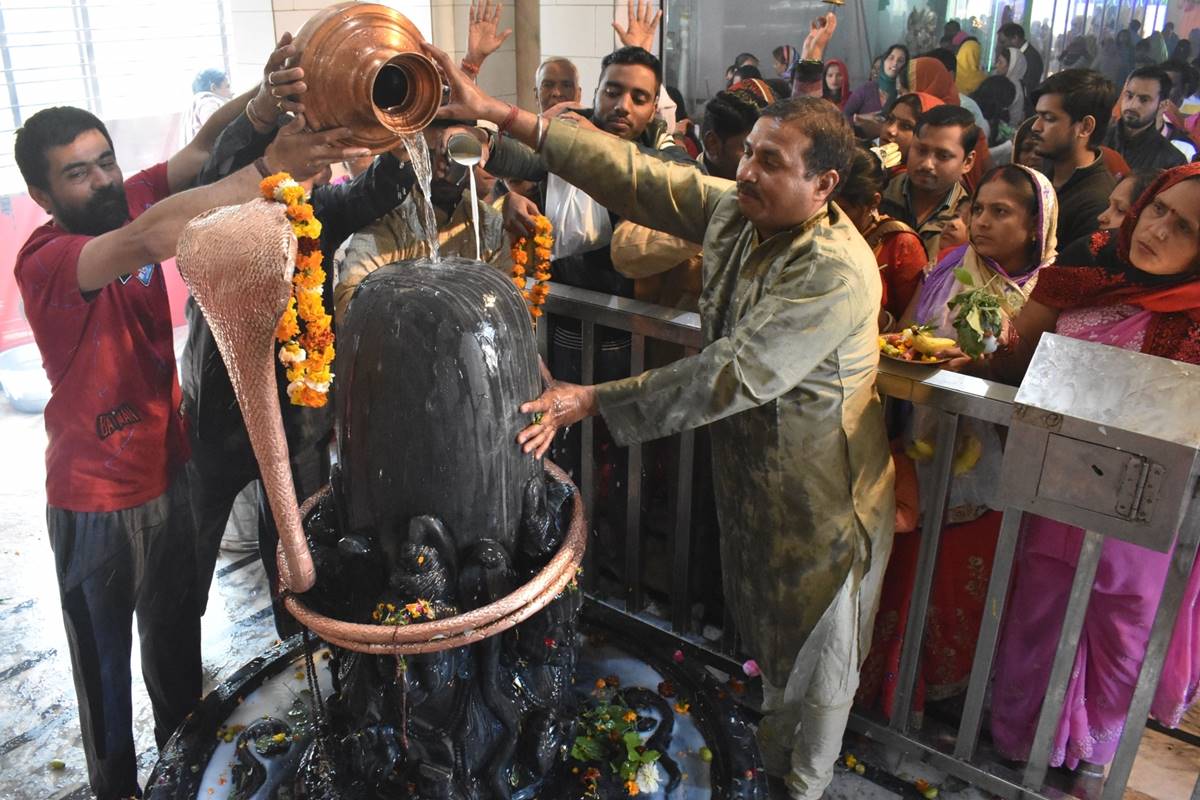Mahashivratri 2019: Shiva is the third God of the Holy Trinity who represent creation, preservation and destruction, as per Hindu philosophy. Lord Shiva is considered the destroyer of ignorance and misery. Shiva means ‘auspicious’, implying every disaster is followed by something good. Shivratri puja, hence, holds a lot of significance for Hindus.
Mahashivaratri means the ‘Great Night of Lord Shiva’. It is an important festival for millions of Hindu devotees. Celebrated on the 14th night of the dark fortnight in the month of Phalgun (February-March), Shivratri is considered the wedding night of Lord Shiva and Goddess Parvati.
Advertisement
Mahashivaratri 2019 falls on 4 March, Monday.
On Shivratri, devotees of all age groups and gender keep a fast and offer puja late at night as per the muhurt. Here are a few items that they use during the Shivratri puja.
Gangajal: Offering Gangajal from a bronze vessel while chanting Shiva mantra ‘Om Namah Shivaya’ is said to bring calmness in life.
READ | Mahashivratri special: The nuances of Shivratri in Delhi and Jaipur
Cow milk: Cow is the vahan of Goddess Parvati. Lord Shiva deeply loves and respects Parvati and Her vahan cow. Therefore, offering cow milk on the Shivalingam on Mahashivaratri is considered very auspicious. This ritual is believed to bring in Shiva’s blessings for good health and treating severe ailments.
Sandalwood paste: Sandalwood is dearly loved by Lord Shiva. Sandalwood paste is believed to cool down his rage and anger. Coating the Shivalingam with sandalwood paste on Mahashivaratri is done to please Him. This ritual is believed to bless you with fame, recognition and power in society.
Bel patra: Leaves of the Bel tree, also known as Bilva, share a very special relationship with Lord Shiva and play a very important role in the puja on the day of Shivaratri. This leaf is trifoliate which signifies the Holy Trinity of Brahma, Vishnu and Shiva. Bel patra also signifies the three eyes of Lord Shiva. It is believed that if people offer Bel patra to Shivalingam, all their desires are fulfilled. Hence, it is considered one of the most significant ingredients used in the Mahashivaratri puja. It is believed that Goddess Parvati resides as Girija in the roots of Bel tree, as Maheshwari in its trunk, as Dakshayani in its branches, as Parvati in its leaves, as Katyayani in its fruits and as Gauri in its flowers. According to Skanda Purana, the Bel tree emerged from the sweat drops of the Goddess which fell on Mandrachal mountain. Hence, since Goddess Parvati resides in her various forms in this tree, Lord Shiva extremely loves its leaves. The leaves are offered upside down with its stalk towards the Shivalingam and the tip towards the person offering the puja so that the spread of Shivatattva through the tip of the leaf is more and the worshipper gets maximum benefit.
Ber fruit: Ber is the main fruit that is offered to Lord Shiva on Mahashivaratri. The worship of the lord is considered fruitless without the offering this fruit on Shivalingam. Ber fruit is the symbol of longevity and gratification of desires.
Bel fruit: Lord Shiva is very fond of Bel fruit. Therefore, it is considered a sacred fruit in the Hindu faith. The fruit has a much deeper significance in Mahashivaratri rituals as per Vedas and Puranas. After Ber fruit, Shiva likes Bel fruit the most. This fruit is also called Shreephal or Seerphael.
Bhang: Bhang, commonly known as cannabis, is closely linked to Lord Shiva. Offering it on the Shivalingam is said to discard negativity and the presence of evil from life. Lord Shiva has his abode in the ice-covered peaks of Himalayas and it is believed He keeps himself intoxicated with bhang to be able to meditate for long duration and stay warm. There is also a belief that bhang helps him control his anger and thus the world remains safe from his destructive power. Hence, bhang is offered to Lord Shiva on Mahashivaratri.
Dhattoora: Dhattoora is offered to Lord Shiva by devotees on Mahashivaratri. The thought behind it is that they offer all the poisons within them – poison of jealousy, fear, competition, foul language and unkind nature – to the lord in the form of dhattoora. In return, they seek the grace of Shiva to be bestow upon them a pure and benevolent nature.
